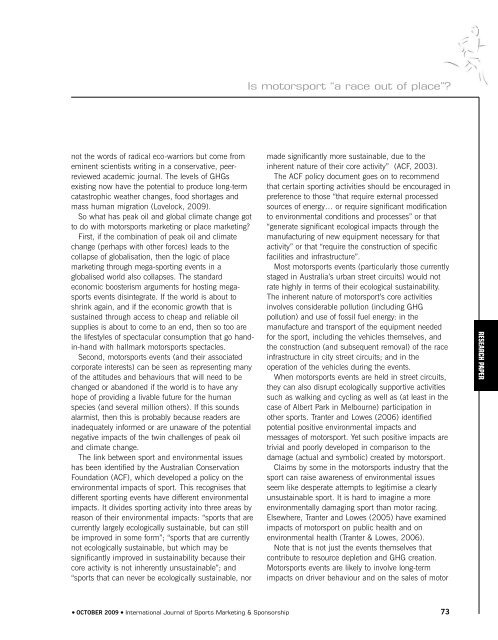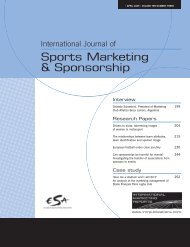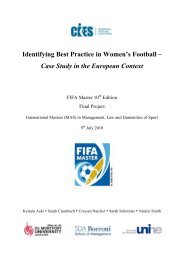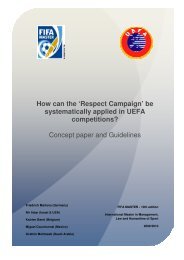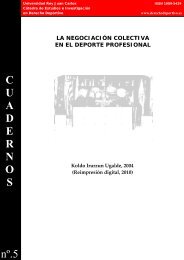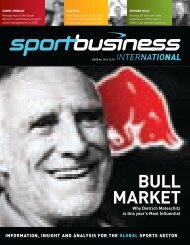Sports Marketing & Sponsorship - FIFA/CIES International University ...
Sports Marketing & Sponsorship - FIFA/CIES International University ...
Sports Marketing & Sponsorship - FIFA/CIES International University ...
- No tags were found...
Create successful ePaper yourself
Turn your PDF publications into a flip-book with our unique Google optimized e-Paper software.
Is motorsport “a race out of place”?not the words of radical eco-warriors but come fromeminent scientists writing in a conservative, peerreviewedacademic journal. The levels of GHGsexisting now have the potential to produce long-termcatastrophic weather changes, food shortages andmass human migration (Lovelock, 2009).So what has peak oil and global climate change gotto do with motorsports marketing or place marketing?First, if the combination of peak oil and climatechange (perhaps with other forces) leads to thecollapse of globalisation, then the logic of placemarketing through mega-sporting events in aglobalised world also collapses. The standardeconomic boosterism arguments for hosting megasportsevents disintegrate. If the world is about toshrink again, and if the economic growth that issustained through access to cheap and reliable oilsupplies is about to come to an end, then so too arethe lifestyles of spectacular consumption that go handin-handwith hallmark motorsports spectacles.Second, motorsports events (and their associatedcorporate interests) can be seen as representing manyof the attitudes and behaviours that will need to bechanged or abandoned if the world is to have anyhope of providing a livable future for the humanspecies (and several million others). If this soundsalarmist, then this is probably because readers areinadequately informed or are unaware of the potentialnegative impacts of the twin challenges of peak oiland climate change.The link between sport and environmental issueshas been identified by the Australian ConservationFoundation (ACF), which developed a policy on theenvironmental impacts of sport. This recognises thatdifferent sporting events have different environmentalimpacts. It divides sporting activity into three areas byreason of their environmental impacts: “sports that arecurrently largely ecologically sustainable, but can stillbe improved in some form”; “sports that are currentlynot ecologically sustainable, but which may besignificantly improved in sustainability because theircore activity is not inherently unsustainable”; and“sports that can never be ecologically sustainable, normade significantly more sustainable, due to theinherent nature of their core activity” (ACF, 2003).The ACF policy document goes on to recommendthat certain sporting activities should be encouraged inpreference to those “that require external processedsources of energy… or require significant modificationto environmental conditions and processes” or that“generate significant ecological impacts through themanufacturing of new equipment necessary for thatactivity” or that “require the construction of specificfacilities and infrastructure”.Most motorsports events (particularly those currentlystaged in Australia’s urban street circuits) would notrate highly in terms of their ecological sustainability.The inherent nature of motorsport’s core activitiesinvolves considerable pollution (including GHGpollution) and use of fossil fuel energy: in themanufacture and transport of the equipment neededfor the sport, including the vehicles themselves, andthe construction (and subsequent removal) of the raceinfrastructure in city street circuits; and in theoperation of the vehicles during the events.When motorsports events are held in street circuits,they can also disrupt ecologically supportive activitiessuch as walking and cycling as well as (at least in thecase of Albert Park in Melbourne) participation inother sports. Tranter and Lowes (2006) identifiedpotential positive environmental impacts andmessages of motorsport. Yet such positive impacts aretrivial and poorly developed in comparison to thedamage (actual and symbolic) created by motorsport.Claims by some in the motorsports industry that thesport can raise awareness of environmental issuesseem like desperate attempts to legitimise a clearlyunsustainable sport. It is hard to imagine a moreenvironmentally damaging sport than motor racing.Elsewhere, Tranter and Lowes (2005) have examinedimpacts of motorsport on public health and onenvironmental health (Tranter & Lowes, 2006).Note that is not just the events themselves thatcontribute to resource depletion and GHG creation.Motorsports events are likely to involve long-termimpacts on driver behaviour and on the sales of motorRESEARCH PAPER● OCTOBER 2009 ● <strong>International</strong> Journal of <strong>Sports</strong> <strong>Marketing</strong> & <strong>Sponsorship</strong>73


